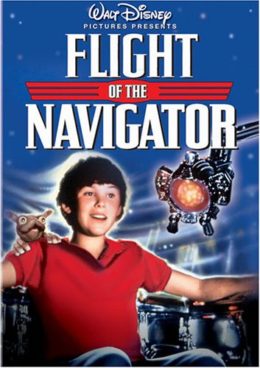Morning, Tor.conkys! Today’s secret word is: NOSTALGIA. Aaaaahhhhhhhh!
Today’s entry in the Movie Rewatch of Great Nostalgia (AAAAAHHHH) is that Disney not-exactly-classic of 1986: Flight of the Navigator!
Previous entries can be found here. Please note that as with all films covered on the Nostalgia (AAAAAHHHH) Rewatch, this post will be rife with spoilers for the film.
And now, the post!
So, before we talk about Flight of the Navigator specifically, I have to warn you (or perhaps entice you, it really depends) with the news that my sisters and I have a soft spot about a thousand miles wide for what I think of (affectionately, believe it or not) as Disney’s Live-Action Trash Movies, and therefore you can expect to see a fair number of them appear over the course of the MRGN. (We already did one, kind of, with Return to Oz, but that one’s something of a borderline case in my opinion.)
Anyway, Disney Live-Action Trash Movies can be extremely loosely defined as all the cheese-ish, shoestring-budget, non-animated children’s movies Disney has churned out over the decades in between their much higher-profile (and much more expensive to make) event animated releases, mostly for the purpose of making some quick bucks in theatres and then padding out their cable channel’s programming schedule. She says, cynically.
Now, this doesn’t encompass all of Disney’s non-animated films, by any means. Some of Disney’s live-action efforts are excellent, well-produced movies that totally deserve to be classics, like Swiss Family Robinson or Mary Poppins, or the much less well-known but still (in my opinion) excellent The Journey of Natty Gann, which I am actually deeply sad falls outside the purview of the MRGN, because it was one of our favorites. No, when I say Disney Live-Action Trash Movies, I mean all the others: your unkillable Herbie franchise, your Shaggy D.A.s, your Polyannas, your random movies about trapped parents or Fridays being freaky or dogs having incredible journeys. I was bemused, in fact, to discover there were actually way more of these than I ever knew existed before. Damn.
Since my sisters and I were giant nerds, though (or, to be more precise, since I was a giant nerd and my sisters, at some point early on, shrugged and went with it), naturally the Disney trash movies we watched the most were the ones with SF elements. And not stupid SF stuff, says Young Me scornfully, like theoretically adorable manic anthropomorphic VW Beetles or lawyers who turn into ugly dogs for theoretical laughs, but real good SF stuff, like possibly murderous British ghosts, or psychic kids from outer space, or cats from outer space, or, you know, anything about outer space.
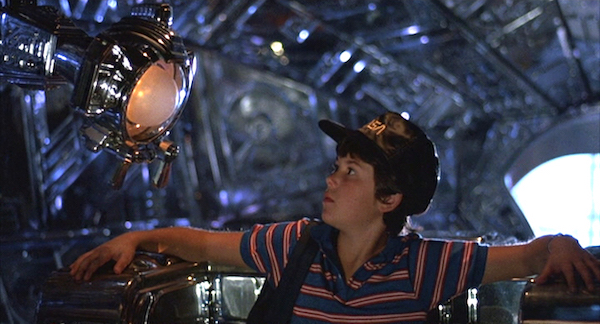
Like, for example, 1986’s Flight of the Navigator. Aha, we circle back! So clever.
A quick plot refresher for those of you who, like us until this week, haven’t seen the movie in a decade or longer: Twelve-year-old David Freeman is living more or less happily in the year 1978 until he falls into a ravine and climbs out to find that somehow eight years have passed in the blink of an eye, because anthropologist aliens, and David and the alien spaceship must then both escape the clutches of a half-heartedly-evil NASA in order to get them both home again, a task fraught with Pee-Wee Herman complications. As so many things are.
Liz in particular was excited to see this movie again because of how much she remembered loving it as a kid. I mean, we all were eager to watch it, but Liz was practically bouncing up and down in anticipation. She also remembered, pre-viewing, a hell of a lot more detail about what was in the movie than I did, in particular the now-hilarious “alien” menagerie:
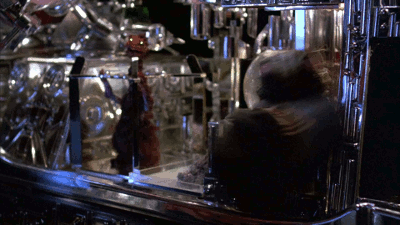
I remembered it the moment she brought it up, but not before then. Until she started throwing details at me, basically what I most vividly remembered was a then only-lightly-known Sarah Jessica Parker and her Twisted Sister purple hair:
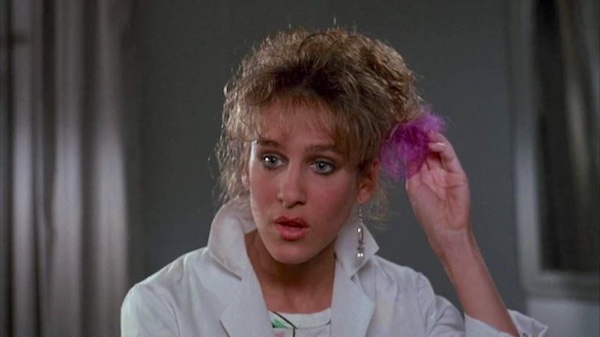
We’re gonna come back to her.
KATE: I mostly remember that the mom was the same actress who played the crazy woman who screamed “WHORES” a lot and died of cherries in Witches of Eastwick.
LIZ & ME: …
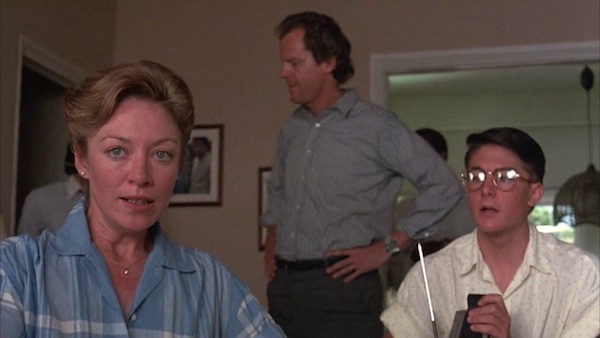
Anyway. I was sad to tell Liz that I suspected this one might not hold up so well to adult eyes, and I was not terribly surprised to discover that I was mostly right. I’m not really sure, however, whether that’s an actual criticism or just an observation, because Flight of the Navigator was so ostentatiously not aimed at an adult audience that my failure to like it as an adult almost proves its point, in a way. And what I mean by that is, virtually every aspect or implication of the story that I found most interesting as an adult were the ones the movie failed to focus on in any significant way, but that may well be because none of those aspects were ones that kids would be likely to focus on either.
There’s a fascinating potential for drama, for instance, in the idea of what would happen to a family who has a child disappear without a trace, only to reappear, unchanged in any way, eight years later. What would it be like to be David’s parents, wonders adult me? Or alternately, wonders sister me, what it would be like to suddenly go from being the oldest sibling to being the youngest, or for David’s brother Jeff to experience the reverse?
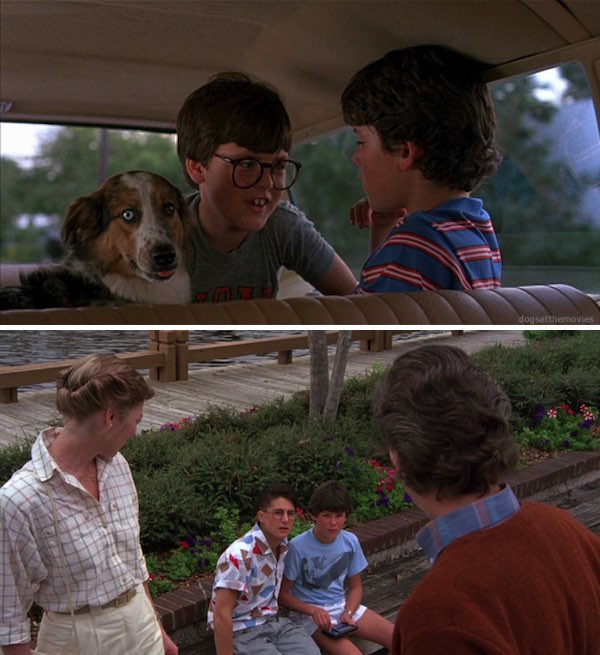
My sisters and I paused the movie for a good five minutes to discuss how we would have felt about this state of affairs, in fact. But other than one scene with David’s younger/older brother Jeff, the movie is basically uninterested in exploring this dynamic because OMG ALIEN SPACESHIP. But then, I don’t know that I can claim that the movie was wrong to do that, because it’s clear that as kids we were basically uninterested in exploring this dynamic either. We were like, yeah that would be kinda weird, but OMG ALIEN SPACESHIP.
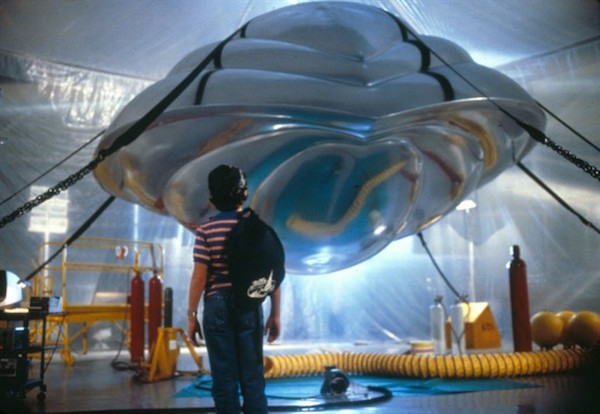
Another interesting-to-adults plot point is the use of NASA as a stand-in for “semi-evil government entity” (which is rather hilarious all on its own), and the potential for a perhaps-clichéd-but-still-relevant exploration of all the ways government bureaucracy and paranoia could jack up first contact with aliens—not to mention how it could destroy the life of a young boy caught in the middle. But again, the movie doesn’t really go there either, instead taking the very kid-like approach of relegating NASA to the same role played by most adults in Kid World: frustrating, vaguely intimidating, but generally well-meaning obstacles to be circumvented.
(As a side note, the technobabble in this movie is hysterical. It’s the kind of word salad found in so many 80s movies, which relied on an audience who they assumed barely understood what computers were, much less how they worked. Granted, a lot of Hollywood technobabble still does that, but the shamelessness of the nonsense level of 80s movies is particularly hilarious. Liz and Kate and I about killed ourselves laughing at one poor technician extra’s declaration that “he’s downloading!” LOL. Also, I do not think “solar hour” means what these alleged astrophysicists think it means.)
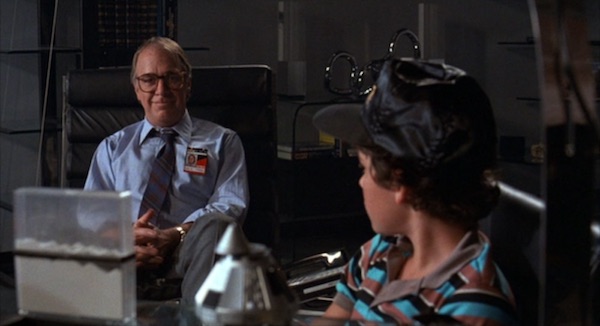
The most egregious example, though, of how Flight of the Navigator is really, really not aimed at adults, is encapsulated in the performance of one Paul Reubens as the voice of “Max”, the alien A.I. who gets more than he bargained for from a twelve-year-old’s brain.
As kids, my sisters and I thought Max was AWESOME. We laughed like loons at his antics, and did not care in the slightest to examine why absorbing the memories of a kid from 1978 would produce the voice of a character who didn’t become popularly known until 1981 (arguably, not really popularly known until 1985, when Tim Burton got involved). It was kid-level dick jokes and juvenile fat jokes and obnoxiousness galore, and we thought it was great.
As adults, on the other hand, we pretty much wanted to find Paul Reubens and punch him in the face. But then, most adults find most twelve-year-old humor to be eminently face-punchable, so once again, is that really a failure of the movie, or is it a success? YOU DECIDE.
(Oddly, Reubens is credited as “Paul Mall” for his voicework in this film, which I can only assume was some kind of bizarre attempt to disavow any association of the “Max” character with the Pee-Wee Herman character. Although if so I don’t know why anyone bothered to try, because that voice is nothing if not distinctive. I mean, I can think of a lot more pungent adjectives to describe it as well, but “distinctive” most definitely applies. I remember being pretty confused by this as a kid, and wondering if the man playing Pee-Wee Herman in the Tim Burton movie and the TV show after it (Pee-Wee’s Playhouse) had decided for some reason to steal Max’s voice. I may even have gotten a little indignant about it, which is fairly amusing in retrospect.)
So, yeah, this meant watching the second half of the movie was a tad painful. This is not to say, though, that watching Flight of the Navigator had no merit to us as adults. One thing that was genuinely most enjoyable to us this time around was the way in which the movie is such a perfect snapshot of its time period—even more so than most movies, in fact, because of its focus on how 1986 was so strange to David’s 1978 time-traveling sensibilities.
The period-specific pop culture references just in this one short scene are glorious: everything from SJP’s fabulously mid-80s fashion aesthetic to the deliberate gender confusion over Twisted Sister to New Coke. The music video in particular (which is an actual song, BTW, which got banned in multiple places because of its “violence”) reminded me gleefully of the years of MTV’s heyday and the in-retrospect (or, actually, even at the time) completely overblown hysteria about the corrupting influence of eeeeevil pop music videos on the Yoots. It was a virtual smorgasbord of lovely nostalgia (AAAAAHHHH)—which is, after all, what we’re here for—and my sisters and I got a huge kick out of it.
In the same vein, we were both amused and wistful at the reminder of just how big a deal NASA was back in the day. The power and influence NASA appears to wield in this movie would almost certainly strike modern audiences as absurd, but we never questioned it for a moment in 1986. This is in spite of—or maybe because of?—the fact that Flight of the Navigator was released smack in the midst of the controversial fallout for NASA in the aftermath of the space shuttle Challenger disaster, which occurred in January of that year. Strangely, until now I don’t remember ever making the association between seeing this movie and the Challenger explosion, even though I was one of the many schoolchildren who witnessed it happen on live television.
Another thing we perhaps perversely really enjoyed, mostly for how very 80s it was, is Alan Silvestri’s score for the film. Unlike his other scores, Flight of the Navigator’s music is entirely electronically generated, courtesy of the Synclavier II, apparently, which is so fabulously vintage an instrument I can hardly stand it:

If you want to make yourself giggle in nostalgic glee I invite you to jump to 3:20 on this soundtrack clip. But you know, for an entirely synthesized score I thought the main theme holds up really rather well overall, and was in fact very appropriate to the subject matter. This was never one of the soundtracks I collected as a kid, but I still remembered it well and liked it.
Also, Liz will kill me if I fail to mention this little guy, whom she wanted (then and now) to love and hug and squeeze and call George:
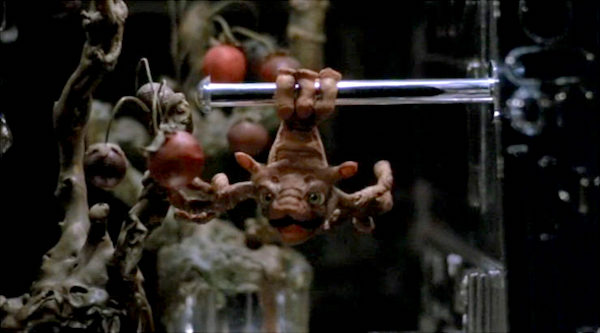
Though Kate and I much preferred, for hilarity purposes, the EYE-EYE-EYE-EYE-EYE-EYE-EYE-EYE-EYE-EYE-EYE-EYE:
I mean, wow.
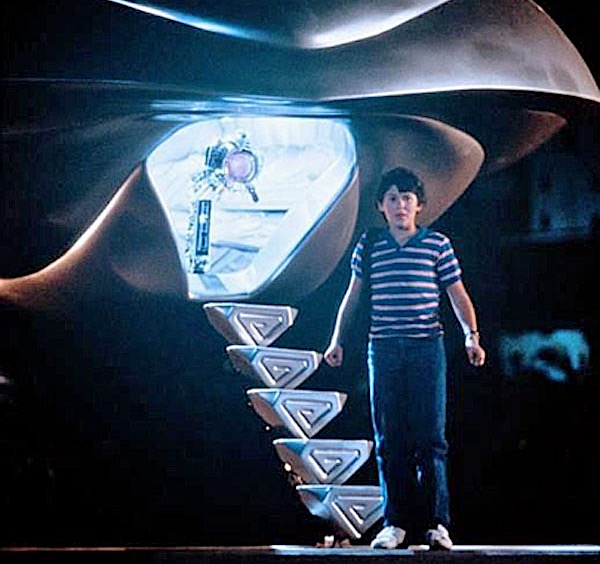
I do also have to congratulate the filmmakers on both their wisdom in keeping the special effects as minimal as reasonably possible, and making their one big special effect (the spaceship door and steps) look as good as technology of the day could make it.
ME: Ooh, shiny.
KATE: Whoever had to polish this set hated their life.
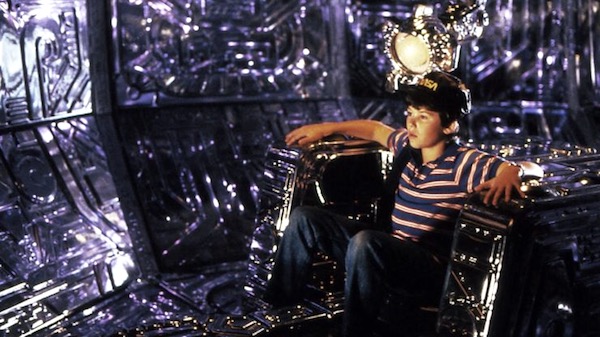
As a final note, we thought that child actor Joey Cramer actually did a very nice acting job playing David in this movie, and wondered why we had never seen him in anything else later on. A Google search, however, revealed that unfortunately Mr. Cramer has, er, not done well as an adult, let’s just say. Yikes.
Anyway. Our general conclusion on Flight of the Navigator was thus: If you’re an adult who’s never seen it as a kid, you will probably be mostly just annoyed at Flight of the Navigator, unless you have a serious jones for mid-80s nostalgia (AAAAAHHHH). Which hey, we’re hardly gonna judge if you do. (Or if you have a serious jones for Pee-Wee Herman performances, which… uh, well, I might judge you a little for that.)
If you have and/or are adjacent to kids, though, you should definitely check it out on their behalf whether you’re into the 80s or not, because if they are anything like we were they will most likely enjoy the crap out of it. Even through her own disappointment with her grown-up reaction to the movie, Liz still cannot wait to show it to 6-year-old Remy, and I am pretty sure he’ll love it too.
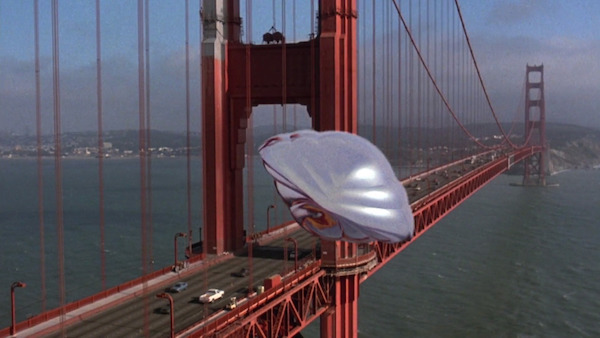
And so! As always, we end this installment of the Movie Rewatch of Great Nostalgia (AAAAAHHHH) with my Nostalgia (AAAAAHHHH) Love to Reality Love 1-10 Scale of Awesomeness!
For Flight of the Navigator:
Nostalgia (AAAAAHHHH): 9
Reality: 7
And that’s it for now, folks! Have a lovely Labor Day weekend if that is relevant to your national interests, and join me in two weeks’ time for our next installment of the MRGN!
Next on the list: Well, I’m sure most of y’all have heard by now about the sad passing of the great Gene Wilder, so in tribute to him, the next MRGN post will cover his classic and hilarious collaboration with Mel Brooks, 1974’s Young Frankenstein. That’s FRONKENSCHTEIN to you! Cheers!










